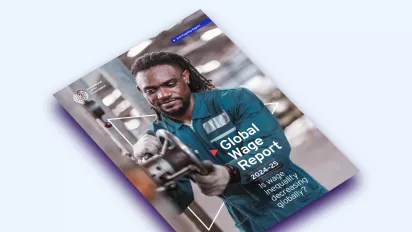
National Minimum Wage Policy
How Namibia sets a historic national minimum wage
With support from the ILO, Namibia has set a historic National Minimum Wage. This policy aims to address income and gender inequalities, protect workers, safeguard businesses and promote a more inclusive economy
26 November 2024
GENEVA (ILO News) Celebrated as Africa’s leading emerging market, Namibia was attracting foreign investment and achieving economic growth. Yet, beneath this progress, extreme income inequality and a deeply divided workforce had more than 40% of its population living in multidimensional poverty. Despite the progress, Namibia’s economic growth had not benefited the majority of its citizens.
In this context, the government turned to Article 95 of the Namibian Constitution, which calls for fair remuneration, to address the income gap with the implementation of a National Minimum Wage. However, this plan brought significant challenges and questions. Could a minimum wage raise incomes and living standards without leading to job losses? Would small businesses manage higher wages without reducing labour costs? To tackle these challenges, Namibia sought the expertise of the International Labour Organization (ILO).
Gender inequality and the fight for fair wages
Income inequality continued to shape the daily lives of many Namibians, with low-wage and informal workers often excluded from the benefits of the country’s economic growth. Gender disparities in the labour market were particularly pronounced. Men predominantly occupied higher-paying industries like construction and mining, while women were concentrated in lower-paying sectors such as domestic work, food services, and caregiving. In rural areas, the gender pay gap was even more severe for women in informal roles, further exacerbating these disparities.
Although women make up nearly 40% of the workforce, they represent almost half of those earning at or below sector-specific minimum wages. With few protections and minimal benefits, women in informal jobs often struggled to achieve financial stability. Aware of these inequalities, the Namibian government saw the National Minimum Wage to not only reduce poverty but also raise pay in traditionally low-wage, female-dominated sectors. A universal wage floor offered the potential to close the gender pay gap and ensure women could participate in the workforce on more equitable terms.
The ILO’s role in crafting a sustainable policy
The ILO has supported Namibia in developing labour laws, enhancing social protections, and establishing fair wage standards from its offices in Harare and Geneva, and tasked a team of wage specialists to evaluate the feasibility of a national minimum wage. The ILO’s strategy was holistic, focusing not just on numbers but on fostering an equitable economy, it sought to set a wage level that could uplift women, empower rural and informal workers, and promote fairness—while ensuring businesses viability.
To ease the transition, the ILO recommended a gradual rollout for sectors like agriculture and domestic work, which might face greater difficulties in meeting the wage floor. Drawing on global examples, including South Africa’s recent minimum wage reform, the ILO proposed incremental wage increases. This approach aimed to avoid economic shocks, give businesses time to adapt, and ensure the policy’s stability, protecting jobs while delivering the intended benefits of higher wages to the nation’s lowest earners.
Building consensus: The power of social dialogue
To ensure the National Minimum Wage policy had wide support, the Namibian government convened the Wages Commission in February 2021 to investigate the feasibility of a minimum wage, providing a platform for employers, workers, and unions, and to collaborate on policy design within a tripartite framework. The Commission organized 13 public hearings across the country, gathering numerous oral submissions and written contributions. These meetings gave an opportunity to the ILO and the government to promote a balanced approach and build a shared vision for the National Minimum Wage that reflected diverse perspectives, laying the foundation for a policy rooted in national consensus.
The government aligned the National Minimum Wage with the second Harambee Prosperity Plan (2021-2025), which aims to boost productivity and generate employment opportunities. The National Minimum Wage policy was positioned not only as a mechanism for fair wages but also as a driver of social cohesion, local business growth, and job creation.
A National Minimum Wage for all Namibians
In early 2022, the Wages Commission proposed a minimum wage of N$18 per hour. The ILO reviewed this recommendation, assessing its potential impact on workers and its economic viability. Namibia adopted a phased approach, including inflation-based adjustments, to ensure wages kept up with the cost of living while remaining manageable for businesses.
As Namibia prepares for the policy's implementation on January 1, 2025, the National Minimum Wage marks a significant milestone for women, especially in sectors like domestic work and agriculture. By gradually raising wages in female-dominated fields, the policy is expected to help reduce the gender pay gap and enhance women’s economic security.
As the ILO remains a crucial partner, providing training and support to help Namibia achieve this transformative goal, for Namibia this National Minimum Wage is more than a policy change, it is a commitment to ensure that economic progress benefits every citizen. This initiative symbolizes a turning point in Namibia’s history, one where work is valued with fair pay and economic justice becomes an achievable goal rather than a distant aspiration. This policy brings Namibia closer to a future of shared prosperity, where every worker earns a fair wage, and the rewards of growth extend to all.
See also

Topic portal
Wages

ILO Flagship report
Global Wage Report 2024-25: Is wage inequality decreasing globally?

Global Wage Report 2024-25
Wage inequality has declined in two-thirds of countries worldwide since start of 21st century